
A tram is an urban rail transit in which vehicles, whether individual railcars or multiple-unit trains, run on tramway tracks on urban public streets; some include segments on segregated right-of-way. The tramlines or tram networks operated as public transport are called tramways or simply trams/streetcars. Because of their close similarities, trams are commonly included in the wider term light rail, which also includes systems separated from other traffic.

Direct current (DC) is one-directional flow of electric charge. An electrochemical cell is a prime example of DC power. Direct current may flow through a conductor such as a wire, but can also flow through semiconductors, insulators, or even through a vacuum as in electron or ion beams. The electric current flows in a constant direction, distinguishing it from alternating current (AC). A term formerly used for this type of current was galvanic current.

Lighting or illumination is the deliberate use of light to achieve practical or aesthetic effects. Lighting includes the use of both artificial light sources like lamps and light fixtures, as well as natural illumination by capturing daylight. Daylighting is sometimes used as the main source of light during daytime in buildings. This can save energy in place of using artificial lighting, which represents a major component of energy consumption in buildings. Proper lighting can enhance task performance, improve the appearance of an area, or have positive psychological effects on occupants.

A lantern is a source of lighting, often portable. It typically features a protective enclosure for the light source – historically usually a candle, a wick in oil, or a thermoluminescent mesh, and often a battery-powered light in modern times – to make it easier to carry and hang up, and make it more reliable outdoors or in drafty interiors. Lanterns may also be used for signaling, as torches, or as general light-sources outdoors.

Electrocution is death or severe injury caused by electric shock from electric current passing through the body. The word is derived from "electro" and "execution", but it is also used for accidental death.

Sheffield Town Hall is a municipal building on Pinstone Street in the City of Sheffield, England. The building is used by Sheffield City Council, and also contains a publicly displayed collection of silverware. It is a Grade I listed building.

A chandelier is an ornamental lighting device, typically with spreading branched supports for multiple lights, designed to be hung from the ceiling. Chandeliers are often ornate, and they were originally designed to hold candles, but now incandescent light bulbs are commonly used, as well as fluorescent lamps and LEDs.

A gobo is an object placed inside or in front of a light source to control the shape of the emitted light and its shadow.

Light industry are industries that usually are less capital-intensive than heavy industries and are more consumer-oriented than business-oriented, as they typically produce smaller consumer goods. Most light industry products are produced for end users rather than as intermediates for use by other industries. Light industry facilities typically have a smaller environmental impact than those associated with heavy industry. For that reason, zoning laws are more likely to permit light industry near residential areas.
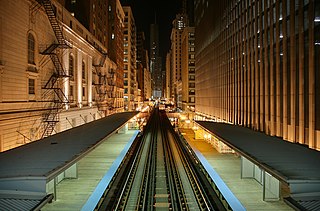
Urban rail transit is a wide term for various types of local rail systems providing passenger service within and around urban or suburban areas. The set of urban rail systems can be roughly subdivided into the following categories, which sometimes overlap because some systems or lines have aspects of multiple types.
Various terms are used for passenger railway lines and equipment; the usage of these terms differs substantially between areas:
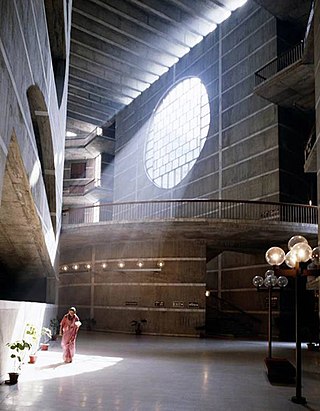
Architectural lighting design is a field of work or study that is concerned with the design of lighting systems within the built environment, both interior and exterior. It can include manipulation and design of both daylight and electric light or both, to serve human needs.

A lampshade is a fixture that envelops the light bulb on a lamp to redirect the light it emits. The shade is often affixed onto a light fixture to reduce the intensity of the light to observers, shield the light from a harsh environment, or for decoration by altering the color or creating shadows.

A light fixture, light fitting, or luminaire is an electrical lighting device containing one or more light sources, such as lamps, and all the accessory components required for its operation to provide illumination to the environment. All light fixtures have a fixture body and one or more lamps. The lamps may be in sockets for easy replacement—or, in the case of some LED fixtures, hard-wired in place.

A candelabrum is a candle holder with multiple arms. "Candelabra" can be used to describe a variety of candle holders including chandeliers. However, candelabra can also be distinguished as branched candle holders that are placed on a surface such as the floor, stand, or tabletop. The chandeliers, on the other hand, are hung from the ceiling.

Tines, prongs or teeth are parallel or branching spikes forming parts of a tool or natural object. They are used to spear, hook, move or otherwise act on other objects. They may be made of wood, bone, metal, or similar materials.
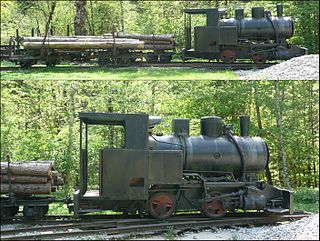
Tramways are lightly laid industrial railways, often not intended to be permanent. Originally, rolling stock could be pushed by humans, pulled by animals, cable-hauled by a stationary engine, or pulled by small, light locomotives. Tramways can exist in many forms; sometimes simply tracks temporarily placed on the ground to transport materials around a factory, mine or quarry. Many use narrow-gauge railway technology, but because tramway infrastructure is not intended to support the weight of vehicles used on railways of wider track gauge, the infrastructure can be built using less substantial materials, enabling considerable cost savings.
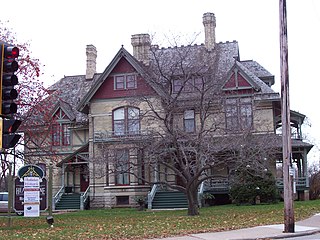
The Hearthstone Historic House Museum is a historic home in Appleton, Wisconsin, United States that has been converted into a museum. On September 30, 1882, it became the first residence in the US powered by a centrally located hydroelectric station using the Edison system. At that time, the house was the residence of Henry James Rogers, a paper company executive and entrepreneur. It was listed on the National Register of Historic Places on December 2, 1974. The house was previously known as the Henry J. Rogers House.

The California Theatre was located at 414 Bush Street, San Francisco. It was built in 1869 by William Ralston, at that time the treasurer of the Bank of California. S. C. Bugbee & Son were the architects and the theatre cost $250,000 to build. The original theatre was demolished and rebuilt in 1889. It was destroyed in the San Francisco earthquake of 1906. The former site is now a California Historical Landmark, with a historical marker commemorating the theatre and its artists. The original theater encompassed 165 feet of frontage, 117 feet in depth, resting on 4 1/2 foot foundation walls; a handsome building with a dress circle, gallery and 51 foot ceiling space in the interior auditorium.
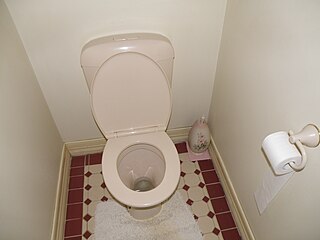
A toilet is a small room used for privately accessing the sanitation fixture (toilet) for urination and defecation. Toilet rooms often include a sink (basin) with soap/handwash for handwashing, as this is important for personal hygiene. These rooms are typically referred to in North America as half-bathrooms in a private residence.























